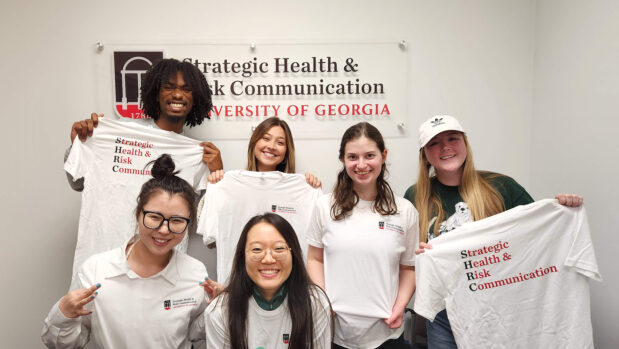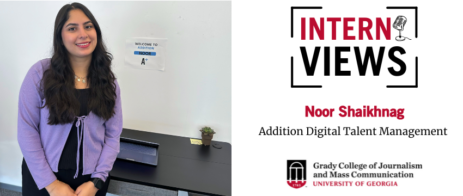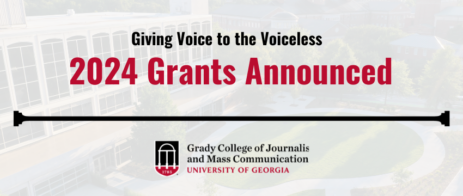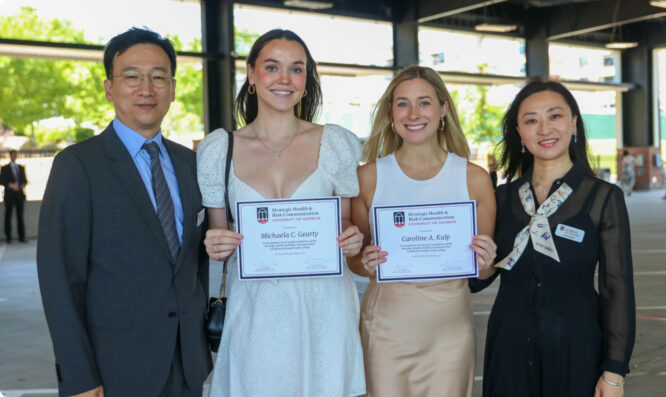Strategic Health & Risk Communication
Strategic Health & Risk Communication Certificate
Gain the knowledge, skills and experience needed to apply communication principles to public health problems.

Overview
Interested in launching an exciting career in health communication, healthcare management, health promotion, health marketing, health reporting or a related field?
The Strategic Health & Risk Communication certificate prepares students to better meet the evolving health needs of society at large and use their health promotion and/or communication skills in an applied manner. The program will culminate in a capstone course in which students will create a public health communication campaign for a community client, providing students with valuable experiential and hands-on learning.
This interdisciplinary certificate program is expected to benefit students as it will qualify them to claim expertise in strategic health and risk communication, and expand their career opportunities in the fast-growing area.
Applications for the SHRC certificate are open every year in the spring. Visit the
SHRC Eligibility page for application dates and details.
ELIGIBILITY
Admission is open to majors in Grady College who meet the following criteria:
- The completion of 24 hours, including a statistics course (any STAT course, BUSN 3000, BIOS 2010+L), and one upper-division studies course (3000 or above) offered by the Department of Advertising and Public Relations (for example, ADPR 3100 Principles of Advertising or ADPR 3850 Public Relations).
- Applicants must have an overall GPA of 3.2 or higher to apply.
- Applicants must submit a formal essay explaining their interest in strategic health and risk communication.
- Application cycles are at the start of each Spring semester. Grady College students apply either when they apply to be a Grady College major or their first semester as a major.
CERTIFICATE TRACK: HOW IT WORKS
The certificate program is designed to be completed in four semesters. Upon admission, students take two required core courses—one offered by Grady College, one offered by College of Public Health—as a cohort. Students then take two additional required courses and two electives. Students will work closely with an advisor to choose electives that align with the student’s interests.
Core Courses
Students will take two required courses in AdPR and HPRB.
Advertising, Public Relations and Health – ADPR 5110
The role of advertising and public relations in the context of the burgeoning “health industry.” Topics discussed include: health communication research practice, the role of advertising and public relations in health care delivery, health promotion and disease prevention, risk communication, and personal as well as psychological well-being.
ADPR 5742 – Health and Risk Communication Campaigns
Students in this course will work in teams to conduct research, planning, and preparation of a health and risk communication campaign designed to solve problems for outside clients. Outside clients can include governmental entities, nonprofit organizations, hospitals, and other related agencies or businesses. Student teams will make a formal presentation to the client.
Note: ADPR 5742/7742 Health and Risk Communication Campaigns (capstone course) must be taken in the final semester when students complete the certificate requirement.
HPRB 1710 – Health and Wellness
Factors affecting the level of wellness of the individual are considered. Topics include mental health, nutrition, diet and weight control, physical fitness, smoking, human sexuality, consumer health, alcohol and other drugs, disease, environmental health, and injury prevention.
HPRB 5310 (E) – Introduction to Public Health Communication
Practical introduction to public health communication from the individual to the societal level. Covers foundational communication concepts that impact health behavior, including media effects, persuasion, message development, media relations, entertainment education, health literacy, risk and crisis communication, social media, social marketing, organizational communication, and patient-practitioner communication.
Elective Courses
Students will take two advanced health and risk communication courses, in consultation with an advisor. Students also will be encouraged to take additional courses in the field, and to use their experiential learning courses in SHRC-related work.
Choose two of the following upper-level courses:
3520E – Graphic Communication
ADPR 3110 – Brand Storytelling
Students learn the basics of ad design and strategic messaging from tweets to magazine ads, to viral-video scripts, to TV spots.
ADPR 5120 – Crisis Communication
Students develop crisis analysis, planning, and communication skills through class discussion, analysis of theories, case studies, and development of a crisis communication plan.
ADPR 5760 – Digital and Social Comm. Strategies
ADPR 5992 – Advertising and PR Study Abroad (Cannes-Lions)
HPRB 5210 – The Effects of Drug Use and Abuse
HPRB 5060 – Educational Strategies in Human Sexuality
HPRB 3150 – Issues in Women’s Health
HPRB 3750 – Foundations of Injury Prevention
Other courses may satisfy the requirement with an approval of the program director.
FACULTY
-
Learn More
Jeong-Yeob Han
Associate Professor; Director of Strategic Health & Risk Communication Program; Director of Analytics, Insights, & Measurement (AIM) Club
About: Dr. Han teaches undergraduate Health Communication and Health & Risk Communication Campaigns courses and graduate Mass Communication Research Method and Technology and Health courses. Research foci include health communication […]
The Latest
Read the newest headlines, get updates and discover events happening at Grady.

Grady InternViews: Amanda Whylie
This is part of a series where we ask Grady College students to describe their internship experience. Amanda Whylie is a fourth-year entertainment & media studies student working at Omnicom […]

Remembering Ruthann Lariscy
Ruthann Lariscy was the type of friend who celebrated birthdays of colleagues deployed overseas by shipping them a party-in-a-box, complete with a birthday cake. She was the type of professor […]

Grady InternViews: Melanie Levi
This is part of a series where we ask Grady College students to describe their internship experience. Melanie Levi is a fourth-year journalism student working with Fox News Channel as […]

Grady InternViews: Noor Shaikhnag
This is part of a series where we ask Grady College students to describe their internship experience. Noor Shaikhnag is a fourth-year entertainment & media studies and communication studies student […]

Grady InternViews: Ryan Langner
This is part of a series where we ask Grady College students to describe their internship experience. Ryan Langner is a fourth-year advertising student working with Apple as a Partner […]

2024 Giving Voice to the Voiceless grants announced
Projects that use music to benefit dementia patients, help Atlanta public school students express their identities and provide an outlet to combat name-based discrimination in science are just a few […]

Perspectives
“Strategic communication in health is a bridge connecting between the public and health, which reduces the information gap in a clear and easily understable way.”
Lanlan Zhang
2023 graduate of the SHRC program

Perspectives
“I chose to pursue the Strategic Health and Risk Communications certificate because I wanted to equip myself with the knowledge and skills to bridge the gap between complex health information and the general public.”
Michaela Gearty
(AB ’23)

Perspectives
“My grandparents lived in an assisted living facility, and during the pandemic, we were unable to spend quality time with them. I decided that becoming an event planner in a retirement community would be a fulfilling career for me. I received an email about the Health and Risk Communications certificate program and it seemed to be a perfect fit for my career goals!”
Caroline Kulp
(AB ’23)

Apply
Gain expertise in strategic health and risk communication, and expand your career opportunities in this fast-growing area.
